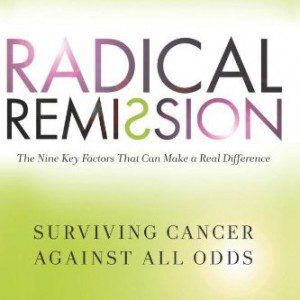Guest Writer for Wake Up World
When I was researching my book Mind Over Medicine, I stumbled across the Spontaneous Remission Project put together by the Institute of Noetic Sciences, which collected over 3500 case studies published in the medical literature about people who experienced spontaneous remissions from seemingly “incurable diseases.” Most of the case studies revolved around people with Stage 4 cancers who either declined conventional treatment or were given treatment deemed by doctors to be inadequate for cure. But the Spontaneous Remission Project also includes case studies of people who had remissions from heart failure, autoimmune diseases, high a gunshot wound to the head, and HIV.
The question reverberating in my mind and keeping me awake at night after reading these case studies was “How did they do this? Were these people just lucky, or did they do something proactive?” None of the case studies even commented on what had happened. But since I wrote Mind Over Medicine, people have been telling me their stories, and none of the people who experienced spontaneous remissions strike me as lucky. Every single one of them was an active participant in their cure.
Radical Remission
I’m not the only one who was wildly curious about whether people experiencing cures from “incurable” illnesses were doing something to improve their chances of cure. Kelly A. Turner, PhD studies people who have experienced what she calls “radical remissions.” She prefers the term “radical remission” because she says there’s nothing “spontaneous” about these remarkable cures.
Kelly and I became friends when I was researching Mind Over Medicine, and I shared some of Kelly’s work in my book. But her research has been ongoing, and Kelly’s new book Radical Remission: The Nine Key Factors That Can Make A Real Difference has since launched. What Kelly discovered is that the people who experienced radical remissions were not passively sitting by, waiting for a miracle. They were making nine significant changes in their lives, only two of which might be recommended by a forward-thinking physician.
Stories of Radical Remission
There is much to appreciate and admire about Radical Remission, but some of its most remarkable elements are the stories of people who have been cured from Stage 4 cancers.
Take Matthew, for example, who was diagnosed with terminal brain cancer at twenty-seven years old. He had tried everything Western medicine had to offer and his doctors had given up and turned him over to Hospice care. With nothing left to lose, Matthew decided to embark upon a spiritual adventure, so his friends and family all donated money to send him to see the healer John of God in Brazil.
Once he was in Brazil, after waiting in line to see the healer, Matthew shared his desire with John of God- to be healed of his brain cancer. After having his energy field read and being given a burst of healing energy, Matthew was instructed to start taking energetically infused passionflower herbs every day and to meditate daily in the main meditation room with John of God. Only about a hundred people are invited at a time to meditate in the main room, where a strong current of energy is believed to course through the room.
Most people only see John of God for a short period of time, but Matthew was told to stay in Brazil until he was fully healed, and since he had no more options back home, he decided to stay. After two years of spiritual practice with John of God, he was told to go to a hospital and get an MRI. Before the results came in, Matthew knew his tumor was gone. The MRI confirmed that he had been cured. Matthew spent the next two years volunteering in Brazil to help others going through their own healing process.
Radical Remission doesn’t make any unrealistic claims, suggesting that if people follow the 9 tips shared in this book, their cancers will go away. But it does make a case for ensuring that any cancer treatment include not just surgery, chemotherapy, and radiation, but also the essential “treatments” that these remarkable patients embraced in their own healing journeys.
9 Key Factors
So what were the 9 key factors that these patients with radical remissions employed? Dr. Turner goes into much more detail about these 9 key factors in the book. In fact, each factor has its own chapter, as well as stories of how patients used these factors to participate actively in their healing journey. But here are the nine overlapping factors her research uncovered.
1. Radically changing your diet.
2. Taking control of your health.
3. Following your intuition.
4. Using herbs and supplements.
5. Releasing suppressed emotions.
6. Increasing positive emotions.
7. Embracing social support.
8. Deepening your spiritual connection.
9. Having strong reasons for living.
It’s Not Just Treatment; It’s Prevention
Radical Remission is worth reading not just for cancer patients and those who love them, but for anyone interested in cancer prevention. While Dr. Turner’s research is observational data, meaning that we can’t prove that these factors caused the cancer remissions. We can only observe that these patients shared these life changes in common.
But shouldn’t we consider making these kinds of changes anyway? Why wait until we get cancer? Why not be proactive now?
Radical Remission offers practical tips for how to make such changes, whether you’re dealing with cancer or trying to prevent it. Let me say again that nobody is suggesting that cancer patients shouldn’t get conventional medical treatment. But let’s not stop there. Let’s do everything we can to optimize the chance for cure by combining conventional treatment with the kinds of mind-body approaches I share in Mind Over Medicine and Dr. Turner shares in Radical Remission. With this kind of Whole Health approach, we can rest easy, knowing that we’ve done everything possible to optimize health outcomes.
Love,
Previous articles by Lissa:
- 10 Health Habits They Don’t Teach in Medical School
- 8 Ways Overcoming Fear Can Improve Your Health
- 10 Fun Ways to Reduce Your Cortisol Levels
- 6 Stories To Make You Believe In The Power Of The Mind To Heal You
-
6 More Stories To Make You Believe In The Power Of The Mind To Heal You
- A Radical Way To Grow Spiritually In A Relationship
- Why Engaging In Work You Love Could Save Your Life
- The Health Benefits Of Finding Your Tribe
- 7 Tips For Finding Your Tribe
About the author:
 Dr. Lissa Rankin, MD is a mind-body medicine physician, founder of the Whole Health Medicine Institute training program for physicians and health care providers, and the New York Times bestselling author of Mind Over Medicine: Scientific Proof That You Can Heal Yourself. She is on a grass roots mission to heal health care, while empowering you to heal yourself.
Dr. Lissa Rankin, MD is a mind-body medicine physician, founder of the Whole Health Medicine Institute training program for physicians and health care providers, and the New York Times bestselling author of Mind Over Medicine: Scientific Proof That You Can Heal Yourself. She is on a grass roots mission to heal health care, while empowering you to heal yourself.
Lissa blogs at LissaRankin.com and also created two online communities – HealHealthCareNow.com and OwningPink.com. She is also the author of two other books, a speaker, a professional artist, an amateur ski bum, and an avid hiker. Lissa lives in the San Francisco Bay area with her husband and daughter.
Connect with Lissa on Facebook.

If you've ever found value in our articles, we'd greatly appreciate your support by purchasing Mindful Meditation Techniques for Kids - A Practical Guide for Adults to Empower Kids with the Gift of Inner Peace and Resilience for Life.
In the spirit of mindfulness, we encourage you to choose the paperback version. Delve into its pages away from screen glare and notifications, allowing yourself to fully immerse in the transformative practices within. The physical book enriches the learning process and serves as a tangible commitment to mindfulness, easily shared among family and friends.
Over the past few years, Wake Up World has faced significant online censorship, impacting our financial ability to stay online. Instead of soliciting donations, we're exploring win-win solutions with our readers to remain financially viable. Moving into book publishing, we hope to secure ongoing funds to continue our mission. With over 8,500 articles published in the past 13 years, we are committed to keeping our content free and accessible to everyone, without resorting to a paywall.








